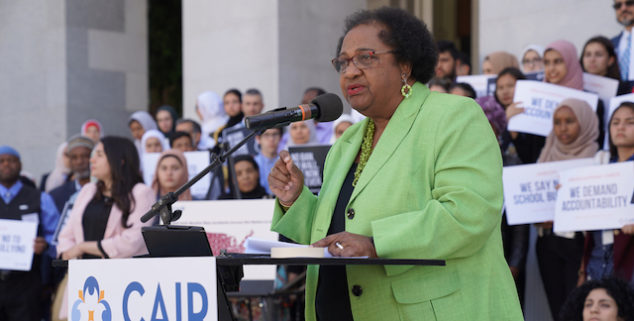News
Difficulties plague Sec State’s hoped-for searchable database
 Secretary of State Shirley Weber, then an Assembly member, on the steps of the Capitol in 2018. (Photo: Phil Pasquini, Shutterstock)
Secretary of State Shirley Weber, then an Assembly member, on the steps of the Capitol in 2018. (Photo: Phil Pasquini, Shutterstock)More than three years after lawmakers unanimously called for it, the Secretary of State has yet to compile a searchable database to help voters get in touch with the people they put in office.
AB 2707 was signed into law by then-Gov. Jerry Brown in September 2018. It gave the Secretary of State until July 2020 – nearly two years’ lead time – to have the site up and running.
Voters, it was envisioned, would then have one-stop easy access to office contact information for elected officials at all levels of government. That hasn’t happened.
“The requests for offers were sent out to over 100 vendors. Both requests were unsuccessful. — Joe Kocurek.
The website was to include “the names and contact information, including the office phone number, email address, and office address, of each voter’s specified local, state, and federal elected officials” as well as “elective officers of a city, county, school district, and special district.”
All a voter would have to do is provide their address and the contacts would be displayed for them.
But things didn’t go as planned. The Secretary of State’s office twice issued requests for proposals from technology contractors but came away empty handed both times.
“The requests for offers were sent out to over 100 vendors,” said spokesman Joe Kocurek. “Both requests were unsuccessful.”
The law says the Secretary of State could spend $250,000 setting up the site, and $150,000 annually to operate it and keep it up to date. (Money for the site was included in the following year’s budget.)
“I introduced AB 2707 in an effort to facilitate voter engagement by providing a centralized online location where Californians would have easy access to essential information…” — Kevin Mullin
It also says that if the secretary cannot find a vendor and decides not to establish the site, they must say so on the Secretary of State’s homepage “no later than December 1, 2019.”
So far, that has not happened.
The current Secretary of State, Dr. Shirley N. Weber, was a member of the Assembly when the bill was passed. She was one of 79 “aye” votes that sent the bill to the governor.
Kocurek said Dr. Weber “continues to review and analyze options to appropriately implement AB 2707, exploring all avenues including in-house and contract options.”
That was not exactly what the bill’s author, Assemblyman Kevin Mullin, D-San Mateo, had in mind.
“I introduced AB 2707 in an effort to facilitate voter engagement by providing a centralized online location where Californians would have easy access to essential information on each of their elected officials and the legislative process making it easy to share their thoughts and concerns,” he said.
This is the second time the Legislature called for such an exhaustive listing of public officials.
More than three years later and gathering that information is no easier than before.
The bill’s inclusiveness may be part of the challenge. Keeping track of federal, state, county and city officials, along with those elected to special district boards, will be a significant undertaking.
Merely keeping track of special districts might prove the most daunting aspect. California has about 3,300 such districts, many of which have five-member boards serving staggered terms.
This is the second time the Legislature called for such an exhaustive listing of public officials.
It’s still possible for voters to gather that information themselves. But that’s not what the law calls for.
In 2017, AB 1004 by Assemblyman Ian Calderon, D-Whittier, proposed a similar site. That bill, too, passed with unanimous support.
But Brown vetoed that measure, noting that the Secretary of State lacked “a centralized system in place to track these officials.”
“Although well-intentioned, I do not believe this is the time to take on such a task,” Brown wrote in his veto message of the prior bill. “Moreover, it is currently possible to learn the identity of office holders by making inquiries of federal, state and local officials.”
It’s still possible for voters to gather that information themselves. But that’s not what the law calls for, and not what Mullin nor the lawmakers who voted for it would necessarily consider “easy access to essential information.”
“While the legislation allows the Secretary to make the decision not to establish the website in the event no qualifying proposals were received, that decision should be posted on the Secretary of State’s homepage,” Mullin said. “My staff and I will be reaching out to discuss the issue further.”
Want to see more stories like this? Sign up for The Roundup, the free daily newsletter about California politics from the editors of Capitol Weekly. Stay up to date on the news you need to know.
Sign up below, then look for a confirmation email in your inbox.

Leave a Reply